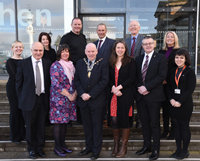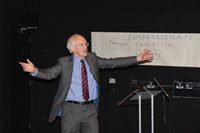Compassionate Inverclyde heralds new approach to end of life care

‘Compassionate Inverclyde’ aims to enable and empower people to help and support one another at times of increased health need, crisis and bereavement.
The new approach is based on the recognition that dying, death and bereavement are inevitable parts of human experience and not the sole responsibility of health professionals.
The new compassionate Inverclyde project was launched today (1 March 2017) by Aileen Campbell, Minister for Public Health and Sport and Inverclyde Provost Robert Moran.
Public Health Minister Aileen Campbell said: “The Compassionate Inverclyde project highlights the benefits of empowering people to help and support each other at times of increased health need and in bereavement, recognising the importance of families and communities working alongside formal services to support those who need it most.

Edinburgh University at the
Compassionate Inverclyde launch
“Working with and building on the strengths of our communities through projects such as Compassionate Inverclyde will play a vital part in achieving our vision of ensuring that everyone in Scotland can access the care and support that is right for them at the end of their lives.”
Ian Marshall, Ardgowan Hospice Acting Chief Executive said, “Ardgowan Hospice has been supporting people living with life limiting illness for over 35 years so we know the challenges and the difficult journeys people face. That is why it is so important that we are part of this new network of national, regional and local organisations and people working together through community action, good practice, research and policy, to ensure that everyone who is facing challenges associated with the end of life is offered the support they need.”
Speaking at the launch Inverclyde Council Provost Robert Moran said: “The principles of Compassionate Inverclyde are in line with our 'nurturing Inverclyde' approach. This aims to make Inverclyde a place which nurtures citizens of all ages. Our aim of ensuring that everyone has the opportunity to have a good quality of life and good mental and physical well-being is as important at the end of life as it is at the beginning. “
The programme for the launch included a moving drama titled ‘Say it like it is’ performed by Harry Connor and John Morrison which highlights real issues around death and dying.
Compassionate Inverclyde builds on the international movement to develop ‘compassionate communities’ to provide support to someone who is experiencing a crisis, loss or is at the end of life.
People in a compassionate community help care for each other through small acts of kindness and do not think it’s the sole responsibility of health professionals.
Partners, including Ardgowan Hospice and Inverclyde Health and Social Care Partnership are developing a public health approach to palliative care called Compassionate Inverclyde.
This programme aims to raise awareness about death, dying loss and care. It also seeks to enlist communities in caring for their own family, friends, neighbours and strangers at the end of life at home or in hospital through local volunteers known as ‘compassionate citizens’.